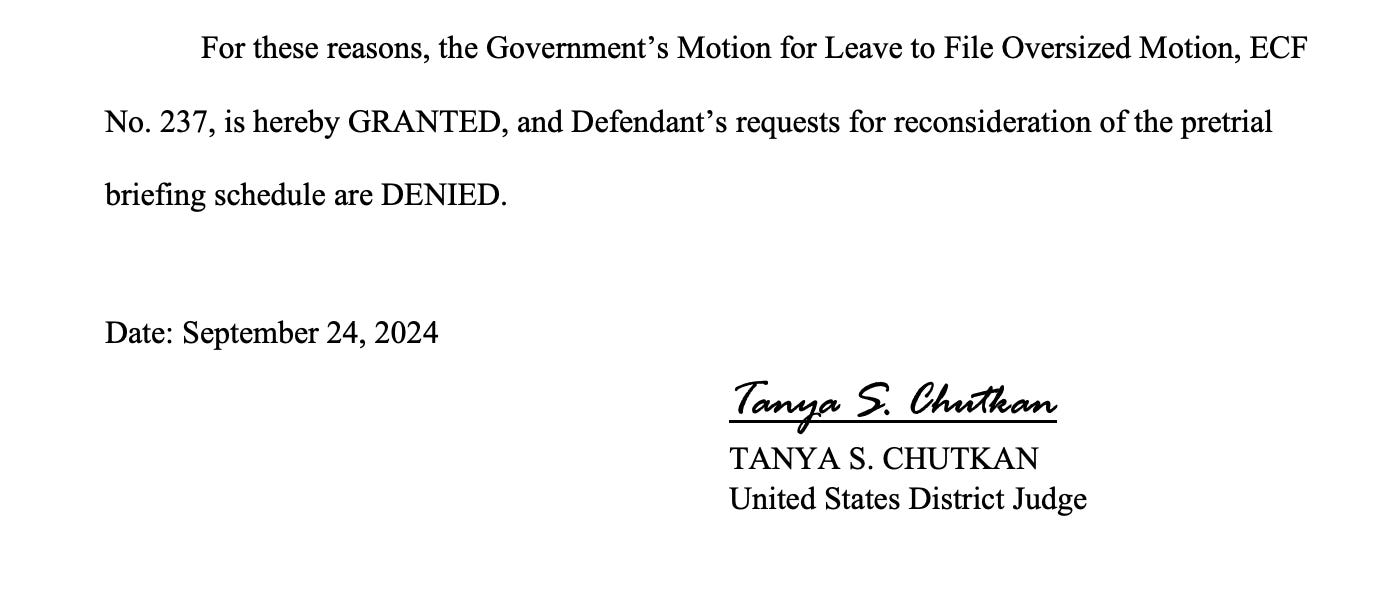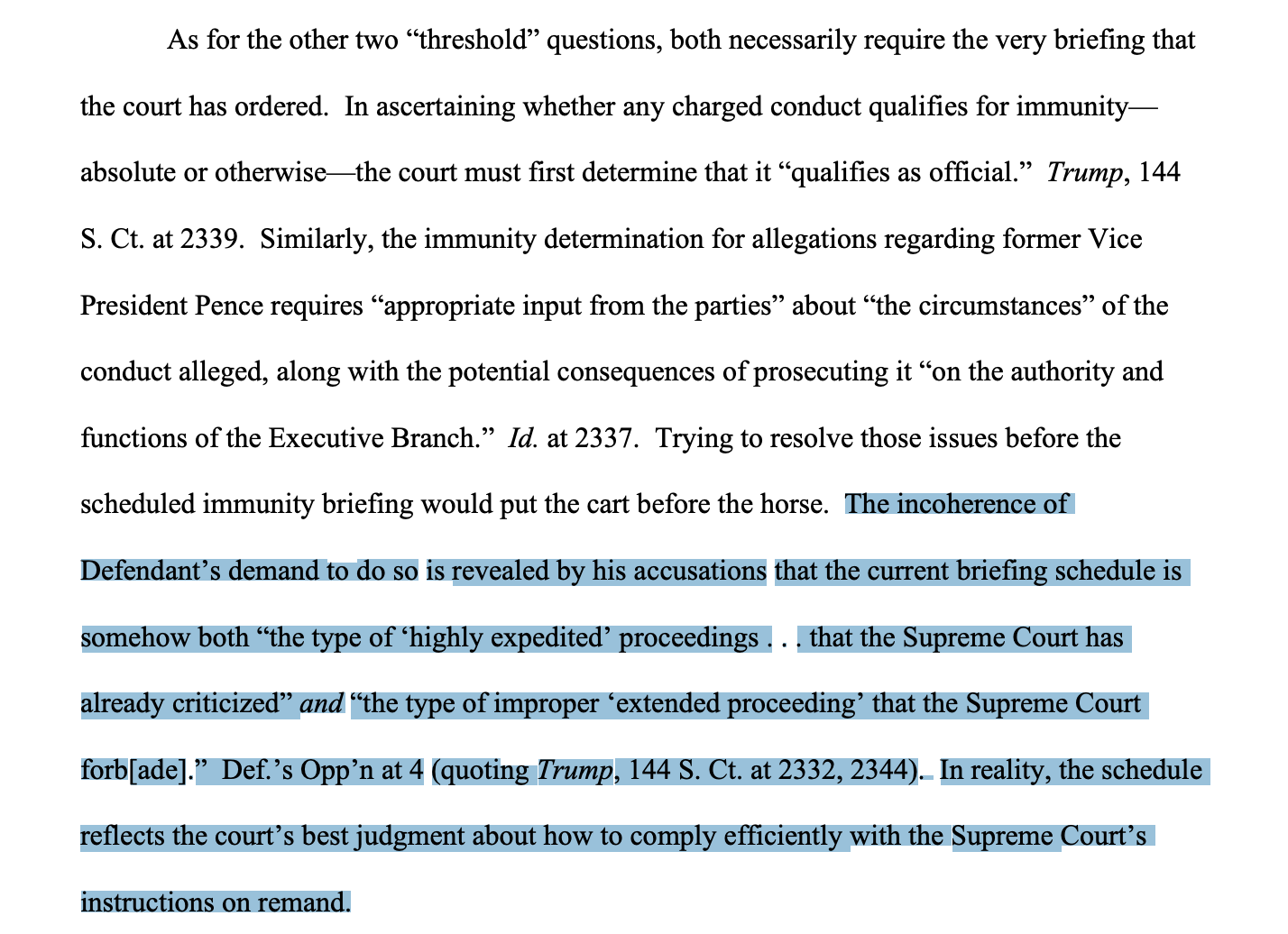Part 1
Usually, when a lawyer files a motion “to exceed the page limits,” there’s not much to discuss. Judges grant these motions sparingly and only for good reasons—no judge wants to read unnecessary legal jargon. That’s why most courts have local rules, as the District of Columbia does, that limit lawyers to a set number of pages for certain types of filings, like the 45 pages allotted to Special Counsel Jack Smith for his opening brief on the presidential immunity issue. Forty-five pages is normally a gracious plenty, but occasionally, there is a need for more.
That was always going to be the case here, as Smith’s Washington, D.C., prosecution of Donald Trump geared back up. Yesterday, Judge Tanya Chutkan granted Smith’s request to use around 180 pages to make his case, over Trump’s objections. And those “objections” are worth discussing.

There was good reason for Judge Chutkan to grant Smith’s motion. She noted that, when it decided the immunity appeal, the Supreme Court “directed this court to conduct a ‘close’ and ‘fact specific’ analysis ‘of the indictment’s extensive and interrelated allegations.’ … It anticipated that the analysis would require briefing on how to characterize ‘numerous alleged interactions with a wide variety of state officials and private persons,’ … and supplementing other allegations with ‘content, form, and context’ not contained in the indictment itself.” Given that Smith has a four-count indictment pending against Trump and that his proof involves quite a volume of evidence, it’s more important for him to lay everything out for the court’s consideration and create the record the Supreme Court required, than to abide by page limits that apply to the usual case.
That should have been the end of it, but because it’s Donald Trump, of course, it wasn’t. Trump didn’t just oppose the government’s request. He asked the court to delay the case—without actually asking for delay. He told the court that it should revoke the process it had established for deciding immunity issues, scheduled to start with Smith’s opening brief this Thursday. Instead, Trump argued—although Judge Chutkan previously rejected his position—the court should let Trump file the first brief, and give him several months to do it.
Judge Chutkan didn’t bite. She granted the Special Counsel's request for extra pages and commented on “The incoherence of defendant's demand” to further delay the trial.

Trump’s lawyers may have thought this was a good, sneaky strategy for delaying the process, but Judge Chutkan was unimpressed. In her order, she noted that Trump only devoted a sentence to the subject at hand, page limits. Judge Chutkan wrote, “The rest of the nine-page opposition rehashes Defendant’s position that immunity briefing should not begin until he files a motion to dismiss several months from now.
The court has already addressed the scheduling objections Defendant raised when he was given an opportunity to do so.” [emphasis mine]
The point here is that the Supreme Court directed the Judge to develop a detailed factual record to support her rulings on what charges/evidence presidential immunity bars the government from using. That's what she's doing, but Trump jumps at any chance to delay the case. His concern about facing justice, like he did in a Manhattan courtroom, couldn’t be any more palpable. While a routine motion for more pages shouldn’t, and wouldn’t normally, merit our time, here it’s worth reviewing Trump’s arguments because he is going to keep doing this, over and over, to try and prevent the case from going to trial. As the Judge puts it, “For the second time in a week, Defendant urges reconsideration of the current pretrial schedule in a brief intended to respond to a separate issue, and without actually filing a motion to that effect.”
Trump, of course, wants the delay because he doesn’t want the public to see the evidence against him during the election. He claimed, in his page limits response, that it was unfair to let Smith detail the evidence against him in the public record “at this very sensitive time in our nation’s history.” Chutkan responded. Smith’s motion will contain the most exhaustive version of the evidence against Trump to date. But that doesn’t mean it will all become public immediately. Smith has already committed that, pursuant to the existing protective order in the case, he will ask the court to withhold sensitive material from public view. Trump doesn’t have much of an argument here. It’s just about delay, like it always is.
Suddenly, there is so much legal news happening that it’s hard to fit it all into the newsletter!

joycevance.substack.com





www.businessinsider.com